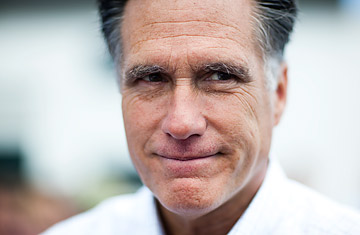
With Iowa's caucuses looming, Romney remains a second choice among many GOP faithful.
(5 of 7)
If the current republican orthodoxy on social issues seems a natural fit for Romney, the party's rightward rush on issues of governance is a markedly less comfortable proposition for him. Romney began to get interested in politics at a moment of centrist creativity--the start of the 1990s. There was a new synergy on policy issues among moderate Democrats (led by Bill Clinton) and so-called Empowerment Republicans (led by Gingrich, amazingly enough). There were fierce differences on some issues, like taxes. But there was a surprising agreement on a new formula for domestic policy: the use of conservative means, like market incentives, to achieve liberal ends. Some of the best ideas were born in the Republican Party and adopted, with modifications, by the Democrats: a cap-and-trade system to control carbon emissions, an individual mandate and progressive government subsidies to create universal health insurance, the earned-income tax credit to bolster the paychecks of the working poor. Romney seemed to fit very neatly into this new, dynamic centrism as governor of Massachusetts.
Michael Brown, a co-founder of City Year, an excellent national-service program, says Romney was one of his strongest supporters even before he entered politics. "In 1991, we invited all the presidential candidates to come and talk," Brown recalls. "After Bill Clinton's talk, he and Romney and I had dinner, and I remember Romney saying to him, 'If you become President, you really should take this program national.'" Later, when Romney was governor, City Year--by then part of AmeriCorps--was in danger of having its funding cut off by the Bush Administration. "We asked Romney if he'd join with Ed Rendell [of Pennsylvania] to author a letter asking for the funding to be restored. He said, 'I'd be happy to do it,' and eventually they got 41 other governors to sign on."
AmeriCorps is precisely the sort of government program that Republicans, including Romney, have been railing against, although Romney hasn't mentioned it specifically. (He does want to cut off the National Endowment for the Arts, the National Endowment for the Humanities, the Corporation for Public Broadcasting and Amtrak, among others.) Indeed, Romney is far more careful about the evisceration of government than his Republican opponents. He doesn't want to close the departments of Education or Energy; he doesn't want to privatize Social Security, just raise the retirement age; he doesn't want to eliminate the capital gains tax, except for people earning less than $200,000; he doesn't want to eliminate the corporate tax, just reduce it to 25%. His proposed Medicare reform is more drastic, essentially a form of privatization, although he would give the elderly the option of staying in the current system, which is a "public option" by any other name.
The Lawn Sprinkler
